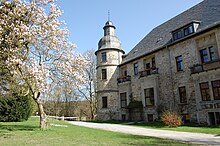Mariano Freiherr von Droste zu Hülshoff
|
This article has been proposed for deletion.
If you are the author of the article, please read through what a request for deletion means and do not remove this notice. |
|
| Justification: Doubts about encyclopedic relevance. - Nadi ( discussion ) 10:42 pm, Aug 13, 2020 (CEST) |
Mariano Freiherr von Droste zu Hülshoff (born January 10, 1907 in Hamborn Castle ; † September 5, 1997 in Vallendar ) was a German forest master .
Life
Origin and family
Mariano Philipp Kunigunde Heinrich Paul Bernhard Hubertus Agathon Freiherr von Droste zu Hülshoff was the only son of the lawyer Heinrich von Droste zu Hülshoff and his wife Paula, nee. Baroness von Ketteler . He was the only male member of Droste zu Hülshoff in the 23rd generation and grew up in his father's Hamborn Castle and (after it was sold) in Münster . He studied law at the Westphalian Wilhelmsuniversität Münster and forest sciences at the Royal Prussian Forest Academy Hannoversch Münden , where he joined the Rheno-Guestfalia Forest Academic Association in the CV . With his wife, Sybille geb. Iltgen (born October 17, 1912 in Essen , † June 28, 1972 in Boppard / Buchholz) he had five children, of whom two sons and one daughter reached adulthood. His sons are also the only male family members of their generation, Bernd von Droste zu Hülshoff and Wilderich von Droste zu Hülshoff .
Career
Droste zu Hülshoff became forester and district hunter in the Prussian district forest office Altenkirchen near Betzdorf in 1937 and took part in the German-Soviet war as a measurement and reconnaissance officer, then in command of an armored train and in 1944 as first lieutenant and deputy regimental commander . Bombed out in Betzdorf, he and his family found asylum in Haus Junkernthal with the Hövel family . His former forestry office was added to the French zone of occupation and came under the administration of the new federal state of Rhineland-Palatinate .
In 1947 Droste zu Hülshoff became forester at the Adenau State Forestry Office , which at the time served the French governor of Rhineland-Palatinate and big game hunter Hettier de Boislambert as a personal hunting reserve. Under pressure from the governor, the previous incumbent had been replaced in this delicate post, who was also responsible for carrying out the French blows, combating hunger-related poaching of the population and reforesting the Ahrbrück air force training area . Droste zu Hülshoff, who knew French and whose grandmother came from Paris, succeeded in mediating between the population and the occupying power. He campaigned for German-French friendship and advised the tenant of the former hunting reserve and mutual hunting friend François Sommer on his initiatives for modern hunting legislation in France and on the design of his Belval (Ardennes) nature reserve . At his invitation, he took part in the International Hunting Exhibition in Paris in 1951 and became an honorary member of the Musée de la Chasse et de la Nature there .
Droste zu Hülshoff carried out extensive reforestation in the Adenau state forestry office in the former restricted military area and made it accessible for the first time by building forest paths. He was a passionate deer hunter and ran a herring. A hunting friend and a neighboring forest owner was Philipp von Boeselager . Droste Hulshoff assisted even in the days of Konrad Adenauer prominent hunting guests of the federal government such. B. Franz Joseph Strauss , Sigismund von Braun , Alfried Krupp von Bohlen and Halbach and Berthold Beitz . In 1962 he moved to the forestry department in the Koblenz administrative district , which under his leadership also took over the forestry departments in the Montabaur and Trier administrative regions. There he was u. a. responsible for the organization of the "diplomatic hunts" of the federal government and was then head of the forest as Oberlandforstmeister until his retirement in 1972.
Voluntary work and honors

Mariano von Droste zu Hülshoff was involved in hunting on a voluntary basis and was president of the "Association of the Nobility on the Middle Rhine ". The Schutzgemeinschaft Deutscher Wald awarded him their badge of honor, the German Hunting Protection Association awarded him the silver badge.
Family history memoirs and interviews
Mariano von Droste zu Hülshoff wrote unpublished "memoirs" about his 90 year life, which was moved by the consequences of two world wars, and gave interviews that are a source for the history of Droste zu Hülshoff in the 19th and 20th centuries.
literature
- Waldtraud Holtz-Honig: The family's first man of the world - Bernd Freiherr von Droste zu Hülshoff. A life for ecology and world heritage , 2016.
- Wilderich from Droste to Hülshoff : 900 years of Droste to Hülshoff . Verlag LPV Hortense von Gelmini, Horben 2018, ISBN 978-3-936509-16-8
Individual evidence
- ↑ a b c Mariano Freiherr Droste zu Hülshoff : Memoirs , Vallendar 1994, Archive Wilderich Freiherr Droste zu Hülshoff
- ^ Genealogical Manual of the Nobility, Volume XVII, page 94
- ↑ Mariano Freiherr von Droste zu Hülshoff: Memoirs, manuscript, p. 88 ff.
- ↑ Waldtraud Holtz-Honig: "The family's first man of the world" - Bernd Freiherr von Droste zu Hülshoff - A life for ecology and the world heritage, Hildesheim, Zurich, New York, 2016, p. 7 ff.
- ^ Forest and Wood, Volume 1, 1997
| personal data | |
|---|---|
| SURNAME | Droste zu Hülshoff, Mariano Freiherr von |
| BRIEF DESCRIPTION | German Oberlandforstmeister |
| DATE OF BIRTH | January 10, 1907 |
| PLACE OF BIRTH | Hamborn Castle |
| DATE OF DEATH | September 5, 1997 |
| Place of death | Vallendar |
